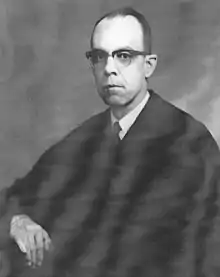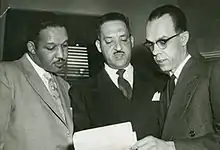Spottswood William Robinson III
Spottswood William Robinson III (July 26, 1916 – October 11, 1998) was an American educator, civil rights attorney, and a United States Circuit Judge of the United States Court of Appeals for the District of Columbia Circuit after previously serving as a United States District Judge of the United States District Court for the District of Columbia.
Spottswood William Robinson III | |
|---|---|
 | |
| Senior Judge of the United States Court of Appeals for the District of Columbia Circuit | |
| In office September 1, 1989 – October 11, 1998 | |
| Chief Judge of the United States Court of Appeals for the District of Columbia Circuit | |
| In office 1981–1986 | |
| Preceded by | Carl E. McGowan |
| Succeeded by | Patricia Wald |
| Judge of the United States Court of Appeals for the District of Columbia Circuit | |
| In office November 3, 1966 – September 1, 1989 | |
| Appointed by | Lyndon B. Johnson |
| Preceded by | George Thomas Washington |
| Succeeded by | A. Raymond Randolph |
| Judge of the United States District Court for the District of Columbia | |
| In office January 6, 1964 – November 8, 1966 | |
| Appointed by | Lyndon B. Johnson |
| Preceded by | James Ward Morris |
| Succeeded by | Gerhard Gesell |
| Personal details | |
| Born | Spottswood William Robinson III July 26, 1916 Richmond, Virginia |
| Died | October 11, 1998 (aged 82) Richmond, Virginia |
| Residence | Richmond, Virginia |
| Education | Howard University School of Law (LLB) |
Education and career
Born in Richmond, Virginia, the son of Spottswood William Robinson II [1893-1954], a lawyer, and Inez Irene Clements [1893-1994], a homemaker, Robinson an undergraduate degree from Virginia Union University and a Bachelor of Laws from Howard University School of Law in 1939, graduating first in his class and achieving the highest scholastic average in the history of the law school.[1] He was a member of the faculty of Howard University School of Law from 1939 to 1948. He was in private practice of law in Richmond from 1943 to 1960. He was counsel and representative for the Virginia NAACP Legal Defense and Educational Fund from 1948 to 1950. He was southeast regional counsel for the NAACP from 1951 to 1960. He was Professor and Dean of Howard University School of Law from 1960 to 1963. He was a member of the United States Commission on Civil Rights from 1961 to 1963.[2]
NAACP LDF cases

In the early 1950s, Robinson and his law-partner Oliver Hill, working through the NAACP Legal Defense Fund, litigated several civil rights lawsuits in Virginia. In 1951, Robinson and Hill took up the cause of the African-American students at the segregated R.R. Moton High School in Farmville, Virginia who had walked out of their dilapidated school. The subsequent lawsuit, Davis v. County School Board of Prince Edward County, was consolidated with four other cases decided under Brown v. Board of Education by the Supreme Court of the United States in 1954. In his arguments before the Court, Robinson made the first argument on behalf of the plaintiffs.[3] Robinson also participated in Chance v. Lambeth, which invalidated carrier-enforced racial segregation in interstate transportation.[4]
Federal judicial service
Robinson received a recess appointment from President Lyndon B. Johnson on January 6, 1964, to a seat on the United States District Court for the District of Columbia vacated by Judge James Ward Morris. He was nominated to the same seat by President Johnson on February 3, 1964. He was confirmed by the United States Senate on July 1, 1964, and received his commission on July 2, 1964, becoming the first African-American to serve on this court.[5] His service was terminated on November 8, 1966, due to elevation to the D.C. Circuit.[2]
Robinson was nominated by President Johnson on October 6, 1966, to a seat on the United States Court of Appeals for the District of Columbia Circuit vacated by Judge George Thomas Washington. He was confirmed by the Senate on October 20, 1966, and received his commission on November 3, 1966.[2] He served as Chief Judge from 1981 to 1986, becoming the first African-American to both serve on this court and serve as Chief Judge of the court. He assumed senior status on September 1, 1989. His service was terminated on October 11, 1998, due to his death in Richmond.[6]
Notable case
Robinson's opinion in Canterbury v. Spence is credited with requiring medical doctors to secure informed consent and as the beginning of a more litigious medical culture.[7]
References
- "Fighter for Civil Rights. Spottswood William Robinson 3d". New York Times. 1961. Retrieved 25 June 2008.
The highest scholastic average in the history of the Howard University Law School is held by Spottswood William Robinson 3d. 'Intellectual' is the word people use to describe him.
- "Robinson, Spottswood William III - Federal Judicial Center". www.fjc.gov.
- "Brown vs. Board of Education: "The Case of the Century."" (PDF).
- "Judge Spottswood W. Robinson III". Brown University. Retrieved 26 June 2008.
- "Brown@50: Fulfilling the Promise". Howard University School of Law. Retrieved 16 April 2014.
- Pace, Eric (13 October 1998). "Spottswood W. Robinson 3d, Civil Rights Lawyer, Dies at 82". New York Times. Retrieved 2015-04-01.
Spottswood W. Robinson 3d, a Virginia civil rights lawyer who argued one of the five cases that led to the Supreme Court's 1954 desegregation ruling in Brown v. Board of Education, died on Sunday at his home in Richmond. He was 82.
- Roberts, Sam (17 May 2017). "Jerry Canterbury, Whose Paralysis Led to Informed Consent Laws, Is Dead at 78". The New York Times. p. B5. Retrieved 17 May 2017.
External links
| Legal offices | ||
|---|---|---|
| Preceded by James Ward Morris |
Judge of the United States District Court for the District of Columbia 1964–1966 |
Succeeded by Gerhard Gesell |
| Preceded by George Thomas Washington |
Judge of the United States Court of Appeals for the District of Columbia Circuit 1966–1989 |
Succeeded by A. Raymond Randolph |
| Preceded by Carl E. McGowan |
Chief Judge of the United States Court of Appeals for the District of Columbia Circuit 1981–1986 |
Succeeded by Patricia Wald |